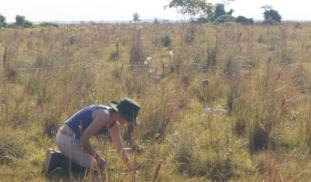378
-8
19
References
- 1. Cerling, T. E., Quade, J., Wang, Y., & Bowman, J. R. (1989). Carbon isotopes in soils and palaeosols as ecology and palaeoecology indicators. Nature, 341(6238), 138–139. doi:10.1038/341138a0
- 2. Davis, M. B. (1963). On the theory of pollen analysis. American Journal of Science, 261(10), 897–912. doi:10.2475/ajs.261.10.897
Please wait...
About This Project
Phytoliths are microscopic silica particles produced by plants that can be easily fossilized and preserved in millions-of-year-old sediments and soils. We test the hypothesis that phytoliths found in the soil of a Savanna in Colombia reflect the surrounding local vegetation. If our hypothesis is correct we can use phytolith analysis for detailed reconstructions of past landscape in order to better understand relationships between past biodiversity, ecosystems, and climate.
More Lab Notes From This Project

Browse Other Projects on Experiment
Related Projects
Illuminating Painted Bunting breeding season diets using eDNA
Given rapid declines in songbird populations, we must understand their trophic relationships to aid in conservation...
What is the vocal repertoire of the Egyptian Fruit Bat?
Advances on audio ML have spurred improvements in bioacoustics and open possibilities for automatically...
Growing symbiotic new senses for humans
This project seeks to experiment with haptic sensory substitution ("a way to bypass one traditional sensory...








